‘Sarpanch Bhagirath’ exposes the existing caste & village politics
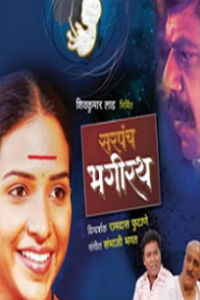 |
Rating: ★★★
Genres: Drama Censor: U Duration: 100 min Studio/presenter: Shivkumar Lad Productions Producer(s): Shivkumar Lad Director: Ramdas Phutane Writer: Asaram Lomte Music: Sambhaji Bhagat Cinematographer (DOP): Charudatta Dukhande Cast: Upendra Limaye, Veena Jamkar, Dr.Mohan Agashe, Kishor Kadam, Savita Malpekar, Swarangi Marathe, Jaymala Inamdar, Vijay Joshi, Meera Umap, Vasant Avsarikar, Uday Lagoo, Anand Panse, Jayvant Wadkar Movie Review by: Ulhas Shirke |
In Maharashtra, we see the network of Panchayati raj spread across villages in different districts, with regular elections. Even with introduction of reservation for women and caste, we still notice the dominance of powerful politicians, who get elected their own trusted people to this most powerful post of Sarpanch, holding the strings in their hands.
Latest released film ‘Sarpanch Bhagirath‘ is set on the backdrop of one such village, in rural Maharashtra, where we find, Kakasaheb Deshmukh ( Dr.Mohan Agashe ) endorsing the name of Bhagirath Girve( Upendra Limaye), a farmer from his village, belonging to OBC category.
Bhagirath, after taking over this coveted post, tries to be impartial, with his straight forward nature. He refuses to bow down to the pressure tactics adopted by Deputy Sarpanch ( Savita Malpekar) and close associates of Kakasaheb. However, kakasaheb being as shrewd veteran politician, tries to play his dirty game, with his divide and rule politics. When, he comes to know that Bhagirath’s wife Rahi( Veena Jamkar) is pregnant, he suggests Bhagirath to abort the foetus , as giving birth to a third child, would disqualify Bhagirath from his post.
Otherwise, a happy family man with progressive thinking , Bhagirath suddenly becomes desperate and insists his wife to go for abortion. His wife refuses to do so. His old parents also go against his wish. On the advice of his close friend ( Kishore Kadam) from the same village, Bhagirath takes his wife to another village hospital and plays his game, by cheating his wife. Later, he repents on his decision and swears to work for the good cause.
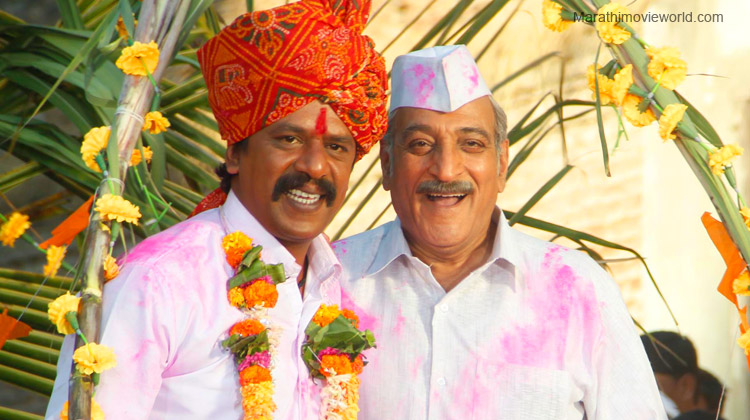
With this limited substance, director Ramdas Phutane, has tried to cleverly induct the caste and religious politics in the screenplay. Another story of Salma( Swarangi Marathe) living in the neighbourhood of Bhagirath, has been used for the purpose of erupting religion based riots. Some of the dialogues are hard hitting on the existing caste and village level politics. The clever use of views expressed by famous political leaders like Sharad Pawar and Sushilkumar Shinde on caste politics in the state, does help to pass on a social message.
Through the characters like Bhagirath, his close friend, his wife and Salma, the film has made a strong statement against caste politics. Therefore, it is a timely film. But, certain situations in the screenplay of this film, fail to convince. How could straight forward Bhagirath become so desperate to take a drastic step, when he is otherwise a balanced person? When he is himself against taking bribe, where from he raises huge money, to bribe the doctor? Does that mean that Power corrupts all. ? And, last but not the least, how his educated poet friend suggests him to do something illegal?
Barring the few above non convincing happenings, this one hour 40 minute long film, is a sincere attempt to deliver a timely message to the society. Music of this film gives a rural feel and lyrics penned for the songs are just apt to the subject. Good performances are given by the lead pair of Upendra Limaye and Veena Jamkar. They look so realistic! Good support also comes from Dr.Mohan Agashe, Kishore kadam, Savita Malpekar & others.
Sarpanch Bhagirath ( सरपंच भगीरथ )

Release Year: 2016 (4 March)
Genres: Drama
Censor: U
Duration: 130 min.
Studio/presenter: Shivkumar Lad Productions
Producer(s): Shivkumar Lad
Executive Producer: na
Director: Ramdas Phutane
Writer: Asaram Lomte
ScreenPlay: Vishnu Surya Wagh
Dialogues: Ramdas Phutane
Official Facebook Page I Twitter
Cast & Crew
Executive Producer: na
Director: Ramdas Phutane
Assistant Director: na
Writer: Asaram Lomte
ScreenPlay: Vishnu Surya Wagh
Dialogues: Ramdas Phutane
Lyrics: Sambhaji Bhagat, Prakash Ghodke
Music: Sambhaji Bhagat
Playback Singer: Sambhaji Bhagat, Anand Shinde, Meera Umap, Chandan Kamble
Cinematographer (DOP): Charudatta Dukhande
Editor: Sarvesh Parab
Starcast: Upendra Limaye, Veena Jamkar, Dr.Mohan Agashe, Kishor Kadam, Savita Malpekar, Swarangi Marathe, Jaymala Inamdar, Vijay Joshi, Meera Umap, Vasant Avsarikar, Uday Lagoo, Anand Panse, Jayvant Wadkar
Costumes: Smita Dhumal
Makeup: Mahesh Barate
Sound : Narendra Patil
Background Score: Rahul Ranade
Choreographer: na
DI, VFX: na
D.I. Colourist: na
Promos: na
Music Label: na
Publicity Designs: Achyut Palav
P.R.O.: na
Distributor : U.R.L Films Distributor
Synopsis
Videos
News / Article / Interview
Music & first look of ‘Sarpanch Bhagirath’ launched.
Ramdas Phutane returns with ‘Sarpanch Bhagirath’
Movie Still(s)
na
Poster(s)

Review
Ramdas Phutane returns with ‘Sarpanch Bhagirath’
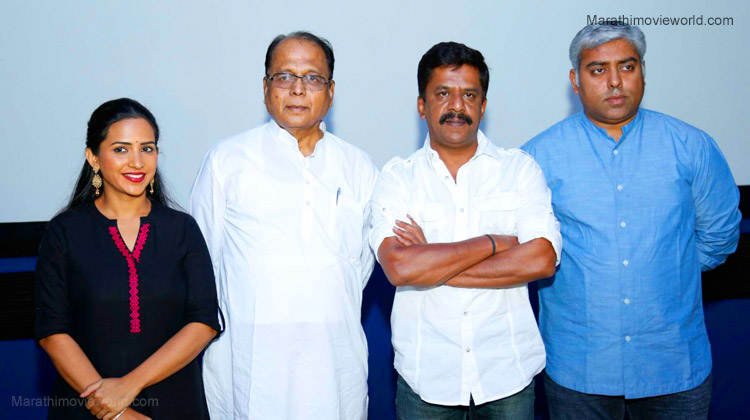
Well Known Poet and film maker Ramdas Phutane, who produced award winning film like ‘Samna’, followed by directing two other Marathi films ‘Sarvasakshi‘ and ‘Survanta‘ has returned to direction after almost two decades. Known for dealing with social issues, on the rural backdrop, through his films, this time Ramdas Phutane makes a strong statement on caste politics and reservation policy, through his forthcoming Marathi film ‘Sarpanch Bhagirath‘.
Story of this film revolves around Bhagirath, played by Upendra Limaye, who is made Sarpanch of the village, being an OBC, by a Political leader of the village. What problems he faces, after taking over this post and how tackles them, doing the balancing act of Political work and home front, is what the film’s story is all about. In the film, talented actress Veena Jamkar plays his wife in the film. Shahir Sambhaji Bhagat scores the music of this film, making his debut as music director in films.
Film’s first look was released on Monday, in presence of producer Shivkumar Lad , director Ramdas Phutane, and the lead pair of Upendra and Veena. The film will be released on 4th March 2016, as per the announcement made by the makers.
Tapaal ( टपाल )
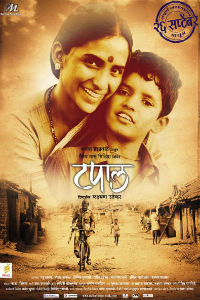
Genres: Drama
Rating: na
Censor: U
Duration: 130 min.
Studio/presenter: Mangesh Hadawale
Producers: Varsha Madhusudan Satpalkar, Maitreya Mass Media
Executive Producer: Anant Bhuwad
Director: Laxman Utekar
Writer: Mangesh Hadawale
ScreenPlay: Mangesh Hadawale
Dialogues: Laxman Utekar
Official Facebook Page I Twitter
Cast & Crew
Executive Producer: Anant Bhuwad
Director: Laxman Utekar
Assistant Director: na
Writer: Mangesh Hadawale
ScreenPlay: Mangesh Hadawale
Dialogues: Laxman Utekar
Lyrics: Prakash Holkar, Laxman Utekar
Music: Rohit Nagbhide
Playback Singer: na
Cinematographer (DOP): Laxman Utekar
Editor: K. D. Dilip
Starcast: Nandu Madhav, Rohit Utekar, Veena Jamkar, Urmila Kanetkar, Jaywant Wadkar, Ganga Gogavle, Milind Gunaji
Costumes: Sanjiv Rajsingh
Makeup: na
Sound : Uday Inamati
Background Score: na
Choreographer: Phulwa Khamkar
DI, VFX: na
D.I. Colourist: na
Promos: na
Music Label: na
Publicity Designs: na
P.R.O.: na
Distributor : na
Synopsis
‘Tapaal’ :na
Videos
News / Article / Interview
‘Tapaal’ will be delivered to audience on 26th Sept
Maitrya Group offer their first film ‘Tapaal’
Movie Still(s)
na
Poster(s)

Review
‘Bhakarkhadi 7 kms’ is a compliment to young doctors practising in villages
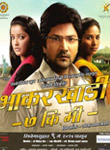 |
Rating: ★★★★
Studio / Presenter: Panoramic Group, Vidyan Siddhi Films Ltd Producer: Dr. Dinesh Vaidya Director: Umesh Namjoshi Writer: Dr.Dinesh Vaidya Cinematographer: Prasad Bhende Music: Kamlesh Bhadkamkar Cast: Aniket Vishwasrao, Veena Jamkar, Suyash Tilak, Apoorva Nemlekar, Renuka Shahane, Dr. Girish Oak, Late Anand Abhyankar, Ashok Samel and Bharat Ganeshpure, Uday Tikekar Movie Review by: Ulhas Shirke |
Only last week we saw a Marathi film ‘Salaam’, which was a tribute to brave soldiers and policemen. Now, film maker Umesh Namjoshi presents his new Marathi film ‘Bhakharkhadi 7 km’, which is not only a compliment to young doctors practising in remote villages, but also an inspiring film to all those young doctors, who hate to practice in our country and aspire to go abroad.
‘Bhakharkhadi 7 km’ tells the story of a young doctor Sameer Deshmukh (Aniket Vishwasrao), who aspires to take up a career as a surgeon in USA after completing his fellowship with Boston Medical College. His dreams are shattered by his involvement in one emergency surgery in a hospital in Mumbai, when the dirty politics played by a Politician, makes him a scapegoat and he is sent to a remote village Bakharkadi off. Melghat, as a punishment.
At the primary health center of this place, he comes across an attending Nurse Renu ( Veena Jamkar), who tries to understand his frustration and reminds him of his duty as a doctor. In the process, the film highlights rural Marathi culture and lifestyle of the villagers, besides their blind faith ; as a result of which, there are sudden deaths of villagers. Using his common sense and medical knowledge, Dr. Sameer makes use of home remedy i.e. activated charcoal powder to treat the people for first aid, as they are poisoned in an epidemic, after drinking the so called holly water, from a particular well, which is not used throughout the year.
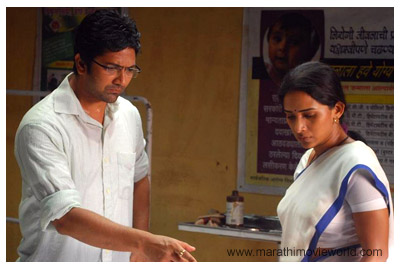
The entire film is based on the duties of a doctor and how people hold them responsible for death of a patient, during operation. In the film, we witness one such incident, where a junior surgeon has to attend to a post operation emergency, in the absence of his senior, whom he is out of station and unable to reach over phone. The patient dies during operation and the patient’s father, who is a Politician attacks the hospital, with the help of his goons. He also wants the junior doctor to be suspended. However, after an inquiry, the doctor is sent on a punishment posting for three years, to a remote village. It is at this remote village, he understands the real duty of a doctor. In fact, in the concluding scene, he does admit that he neither wants to go abroad nor wants to go to a village; but, is required to go, because the village needs his services.
Director Umesh Namjoshi has very effectively developed the story written by Dr. Dinesh Vaidya, into a presentable screenplay, with the help of Nandu Pardeshi, who has also written the effective dialogues of this film. Music has little scope; but the two songs played on the background on the music of kamlesh Bhadkamkar are picturised well. Also , the beautiful photography is captured by Prasad Bhende. The film has very cleverly highlighted the brain drain issue, besides throwing light on the corruption at the administrative level in Health department. But, it has also shown, how a young doctor overcomes all these issues, with the help of a Nurse and other assistants, who motivate him.
Aniket Vishwasrao who plays the central character of Dr. Sameer, in this film; has got a memorable role, which has exploited his talent. We have always seen Aniket as a romantic or action hero; but, this film has offered him a good role; where he has ample scope to display his emotions very efficiently. His performance in this film, is worth to be considered for nomination in best actor’s category, for 2014 awards. Veena Jamkar, who is known for playing a simple woman’s role, has offered good support in the female lead. The film also presents Apoorva Nemlekar in the parallel female lead, as Sameer’s associate and close friend from the Hospital. But, she has limited scope, though she has done a good job. Another important role is by Suyash Tilak, who plays Sameer’s close friend from media.
Renuka Shahane, ActressRenuka Shahane who has done a comeback into Marathi films, has done well in the role of Sameer’s mother and a businesswoman. She too has limited scope. Renowned artistes like Uday Tikekar, Anant Jog, Dr. Girish Oak, Late Anand Abhyankar, Ashok Samel and Bharat Ganeshpure have offered good support through their restricted roles of medical professionals.
Director Umesh Namjoshi has done a fairly good job, in presenting many important sequences in the film, like the emergency Tracheotomy performed by Dr. Sameer on the road; also Dr. Sameer’s frustration on reaching the village of his posting on punishment and his concern and risk taken while treating patients, during the spread of disease, due to consumption of contaminated water. However, he has not been able to show the reaction of people well, who attack the doctors house; when his mother also suffers an injury. This scene doesn’t look realistic. But, barring this lapse, he has handled the rest of the film very well.
‘Bhakharkhadi 7 km’ has a very strong message to convey and is a ‘must watch’ for all those young doctors in Maharashtra. It’s also a compliment to all those doctors, who are sincerely practising their profession in remote villages.
‘Taptapadi’ sets the best example of a good period film in Marathi
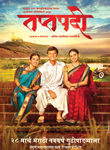 |
Rating: ★★★★
Studio / Presenter: Aryaman Publicity Producer: Sachin Baliram Nagargoje, Hemant Bhailal Bhavsar Screenplay, Direction: Sachin Baliram Nagargoje Cinematographer: Santosh Suvarnakar Music: Sumeet Bellari & Rohit Nagbhide Cast: Kashyap Parulekar, Veena Jamkar, Shruti Marathe, Neena Kulkarni, Sharad Ponkshe, Ambarish Deshpande, Ashwini Ekbote Movie Review by: Ulhas Shirke |
Script plays a very important role in the success of Marathi films. And, when you come to know that the script of a Marathi film is inspired by Ravindranath Tagore’s story; obviously, there will be lot of curiosity about the film. Young film maker Sachin Baliram Nagargoje has dared to present this sensible period story, through his new Marathi film ‘Taptapadi’.
Set on the backdrop of pre independence days period, the film revolves around Meera (Veena Jamkar) who has been brought up by her paternal aunty and her husband (Ashwini Ekbote and Sharad Ponkshe) since her childhood, after the sudden demise of her mother. At her Aunty’s place little Meera becomes friendly with her cousin Madhav (Kashyap Parulekar) who is later sent for his higher studies to Pune. When Madhav returns after a long period, while doing his graduation in medicine; he develops intimate relationship with Meera and the relationship turns into their marriage.
Both live happily, till Meera has a miscarriage. Madhav and Meera shift to Pune, where Madhav is studying in medical college. Not understanding the growth of Glaucoma in Meera’s eyes, Madhav treats her for general irritation. In the process, her trouble aggravates, with poor vision. Finally, when Madhav’s medical college surgeon examines her and suggests immediate operation, it is too late. Meera turns blind. Her aunty, uncle, brother and father suggest Madhav to let her go along with them, so as to take good care of her. But, Madhav feeling the guilt of neglect, wants Meera with him. He takes good care of her.
One fine day, his paternal aunty Durvabai (Neena Kulkarni) arrives at his place, with a plan in her mind. She wants her own well educated niece Sunanda (Shruti Marathe) from Mumbai to marry Madhav. She even invites her to Madhav’s place. And, then begins the real drama. Though, Sunanda becomes friendly with Meera, the negative thoughts running in the mind of Meera makes her more uncomfortable and she displays her anger and frustration., After taking Madhav into confidence for second marriage, Durvabai leaves with her niece. But, destiny has something else to decide. The climax scene of the film, says it all.
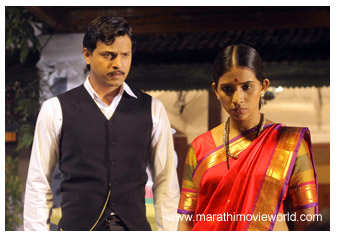
Director Sachin Nagargoje has handled this sensitive love story very well. Having written the screenplay himself, he has been able to present the emotion filled scenes very well. Being a period film, he has cleverly avoided outdoor scenes. But, with the support of good cinematography by Santosh Suvarnakar, he has handled the intimate love scenes very well. Considering Ravindranath Tagore’s love for poems and keeping in mind his love for art; both music and art direction have been well executed in the film. The locations and use of bullock cart, horse carriage and the old styled car used by Madhav, clearly remind you about the old period. Singer Savani Shende, lyricist Vaibhav Joshi and music directors Sumeet Bellari & Rohit Nagbhide have done a good job.
However, the director hasn’t paid attention on miniature details of the make up of Meera, especially after she suffers burn injuries. The healing of wounds on her right hand and face, haven’t been followed in continuity properly. But, barring this small error, he has succeeded in presenting this film very well. Wonderful performances by all the artistes, makes the film more realistic. It is almost like listening to the story of Meera, who is also a narrator in this film.
No wonder, Veena Jamkar has put in her heart into the role of Meera. Even otherwise, she has always been a great performer; but, this role is something special for her. In the character of Sunanda, Shruti Marathe does look a perfect choice. She has played this bubbly cheerful Sunanda with complete understanding of the importance of her role. Kashyap Parulekar, has played his most difficult looking character of Madhav very well. He has cleverly displayed the quick change of emotions, at every important situation, be it, his guilt after his wife turns blind or his reaction while confessing the truth before his wife. In short, he too has proved his selection right.
In the role of Durva atya, Neena Kulkarni has once again proved that she is still the best; no matter whatever type of role comes to her share. The selection of Sharad Ponkshe and Ashwini Ekbote for their respective roles, is just namesake. At least Ashwini has two scenes to display her acting; but Sharad Ponkshe has been wasted, just as an onlooker in few scenes to his share. Ambarish Deshpande has done a good job, in the role of Meera’s brother, though he has little to his share. All others in the supporting cast, including the kids in initial part of the film, look very realistic in their respective costumes, suited to the era.
‘Taptapadi’ sets the best example of a good period film in Marathi; and does succeed in leaving an impact of its tale on the audience. It is certainly a worth watch.
Realistic ‘Tukaram’ is a work of art
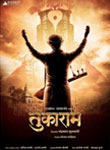 |
Rating: na
Banner: Everest Entertainment Producer: Sanjay Chabria Director: Chandrakant Kulkarni Story: Ajit Dalvi, Prashant Dalvi Cinematographer: Rajan Kothari Editor: Ballu Saluja Cast: Jeetendra Joshi, Veena Jamkar, Ravindra Mankarni, Madhav Abhyankar, Radhika Apate, Sharad Ponkshe, Pratiksha Lonkar, Yatin Karyekar Movie Review by: Ulhas Shirke |
The reality behind the popularity of the literature of Sant Tukaram, the 17th Century saint and poet from Maharashtra was his thought provoking literature. It has been translated into 10 European languages, which itself speaks about his selfless service. In the year 1936, a Biopic made by Prabhat Film Company on this well known Saint, had invited attention from all over the world and the film was the first Indian film to receive award at 5th Venice International Film Festival. The film still remains popular and is subject of frequent studies.
Today, when people have turned to materialistic living, producer Sanjay Chaberia has dared to produce a Biopic on the famous saint, under the direction of Chandrakant Kulkarni and on the script of Ajit Dalvi and Prashant Dalvi. This film focuses on his life before sainthood, trying to cover his childhood with his family and later assisting his father in his traditional money lending business. Very cleverly, the director has tried to show the maturity of young Tukaram in understanding the poverty in his village, during drought and still managing to maintain a balance between his business minded father and the defaulters,using his diplomacy.
The film also goes on to show, how during that period of 17th century, the elders forced their children for second marriage, if the first wife failed to conceive. So, we find a firebrand young woman- Avali walking into the life of Tukaram in presence of his first wife Rakhma, who willingly agrees for the same, to make her mother-in law happy. Initially, Tukaram is not fully devoted to Lord Vitthal; as much as his brother Savji . In fact, as a child, he poses question to his father, as to why he has to travel on a pilgrimage in the form of ‘Vaari’ every year, to seek blessings of Lord Vitthal, when there is already a temple of the same Lord in their village.
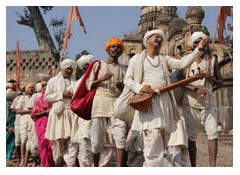
A little before interval, the film shows the transformation of Tukaram into Saint Tukaram, when he leaves his house in search of peace and happiness for all those who suffer the drought conditions. The Saint’s poems and his Kirtans( devotional songs) gather support from devotees from different places, including Bramhmins. This disturbs some of the selfish Bramhins, who demand respect to their profession and feel that no other person from a lower caste has the right to offer kirtans. So, Tukaram is tried in the court of so called religious leaders; and asked to destroy his collections and prevented from writing any more lyrics. The caste discrimination occurring those days, is clearly shown through some of the scenes. But, the popularity of the Saint gathers support from the places around and the Saint is forced to break his 13 day fast.
Director Chandrakant Kulkarni has covered most of the important events in the life of the Saint Poet, starting with his childhood days, his young days, while assisting in his father’s business, post marriage tragic events faced by the family and later his turning towards devotion to God and selfless service to the society. The incidences of his advice to Bahinabai a Varkari female, who later turned a saint from Maharashtra, his encouragement to brave young man from village- Laxman, to join the force of Shivaji Maharaj and also his interaction with the Great Maratha Warrior, have been well captured. The wonderful photography by Rajan Kothari makes the film more appealing, with the proper selection of ideal locations and costumes.
Jitendra Joshi who portrays the popular saint, simply steals the show with his remarkable performance. His body language, dialogue delivery and changing expressions according to the situations, test his tremendous capacity as an actor. Sharad Ponkshe as Bolhoba Ambile More (Tukaram’s father) and Pratiksha Lonkar as Kanakai (Tukaram’s mother), impress with their astonishing performances. Veena Jamkar playing his first wife Rakhma and Smita Tambe playing his sister-in-law, have displayed their talents through those few emotion filled scenes, they have to their credits. Yatin Karyekar as Mambaji Gosavi, the orthodox Bramhin, succeeds in creating an impact through his negative role. Radhika Apte in the role of Aaavli, the saint’s second wife sounds very loud; but that must be going with the requirement of the script. She too has done a good job in the company of artistes like Vikas Patil, Madhav Abhyankar, Ravindra Mankani and others. Padmanabh Gaikwad as young Tukaram has also done a good job. This biopic, is a real tribute to the great saint of Maharashtra.
‘Tukaram’ is a timely release, when we find our own country’s administration surrounded by corrupt practices and the people of today getting used to such practices. Presenting the thoughts of the Saint into a cinematic format and reminding the message behind his meaningful lyrics, with suitable music compositions, this realistic film has turned out to be a real work of art.
Realistic ‘Janma’ is absorbing
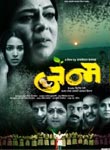 |
Rating: na
Presenters: Kajalkiran Kanakdhara Films Producers: Tapan Acharya, Kajal Kiran Director: Shirish Rane Story : Anand Mhasvekar Screenplay: Anand Mhasvekar Cinematographer: Rahul Jadhav Cast : Veena Jamkar, Reema, Ashok Shinde, Arun Nalawade, Sanjay Mone, Varsha Usgaonkar Movie Review by: Ulhas Shirke |
We all had heard about this Marathi film ‘Janma’ winning many awards at the film festivals and at the Award functions. But, unfortunately, the film was not finding a distributor for a long time. Finally, last week, the film was released and the makers had a sigh of relief while thanking the good Samaritan Sandeep Patil, who came to their rescue.
‘Janma’ presents a realistic tale in the life of a woman – Vandana Sarpotdar (Reema Lagoo) who is a divorcee mother with her only college going daughter – Nisha (Veena Jamkar) struck by leukemia (blood cancer). She struggles to find matching stem cells and bone marrow for her daughter. When a kind hearted doctor (Ashok Shinde) suggests her that only her blood offspring can have matching cells, she seeks help from a Gynaecologist (Smita Talwalkar).
But, things are not that easy for her, as she is 50 years old. Vandana is prepared to take all chances to save the life of her beloved daughter and takes the risk of delivering a baby. She even manages to persuade her ex-husband (Dilip Gujar) who is in relationship with another woman. Through artificial insemination, they produce the desired results but in the process they face another challenge in their life.
Writer Anand Mhasvekar and Director Shirish Rane have succeeded in presenting a realistic tale in an effective manner through an absorbing screenplay.
Paying more attention on the script, instead of unwanted additions required for cinematic format, the film holds the audience to their seats. Every scene has been presented with perfect home work and deep study of advancing medical science. Watch those scenes where the mother is told by her daughter’s attending doctor that the matching stem cells can be possible through her blood offspring and when the Gynecologist reveals the dangers of getting pregnant at 50.
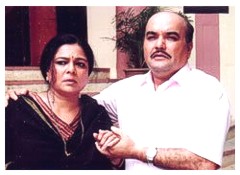
Music does not have much to do with this film, but Mithilesh Patankar has provided a good support to the captivating screenplay. Sachin Natekar’s editing is perfect and so is the camera work by Dhananjay Kulkarni, while capturing all those emotion filled scenes of Mother and daughter. Well suited to his close up shots, all the artistes have performed very well.
This is a film especially for Reema Lagoo and she has given an outstanding performance in that tailor made role. No wonder, she has already won some awards for this role. Veena Jamkar has also played that difficult role of Nisha with confidence. Her body language suggests everything about her ailment. Dilip Gujar has limited role to play, but in two scenes he reacts very well, when he finds two separate rooms booked by his ex-wife and when his wife suggests him for an artificial insemination to serve the purpose. Anand Abhyankar as a well wisher family friend, Ashok Shinde as a doctor at the Cancer Institute and Smita Talwalkar as a Gynecologist, have given a satisfying performance. Others in the college campus are just fine.
The film not only creates that required impact on the audience with its unique attention-grabbing content but also goes on to educate the audience about the progress of medical science.
‘Lalbaug Paral’ – Realistic but Vicious
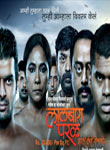 |
Rating: na
Presenter: Dar Motion Pictures Producer: Arun Rangachari Director: Mahesh Manjrekar Screenplay: Jayant Pawar, Mahesh Manjrekar Music: Ajit – Sameer Cast: Satish Kaushik, Siddharth Jadhav, Ankush Choudhary, Veena jamkar, VIneet Kumar, sameer Dharmadhikari, Sachin Khedekar, Kashmera Shah, Ganesh Yadav, Karan Patel, Shashank Shende, Seema Biswas Movie Review by: Ulhas Shirke |
One man’s nightmare is another man’s dream. The closure of Mills in Mumbai was a nightmare to lakhs of workers, but it turned out to be a dream for the owners, who sold their land making crores of rupees out of it in such deals. It was a big game played by Mill owners those days, with the support of government. Not much of attention was paid by the media , which only blamed the adamant Union leader for holding on to his demands.
28 years after this tragic happening in the lives of those lower middle class families, today a film maker dares to describe the inside story and aftermath. ‘Lalbaug Parel (Zhali Mumbai Sonyachi) directed by Mahesh Manjrekar projects various characters, based on the original script of Jayant Pawar, which highlights the consequences of this social issue, totally ignored by the Government. No wonder, after release of this film, the government has started taking steps towards rehabilitation of the mill workers and their families.
The film begins with a scene where a real life script writer (Ankush Chowdhury) showing his old house to his girlfriend from the terrace top of a multi story tower and narrating the tragic story of his family in the flashback. The audience is then taken back to 1982, to show how the shrewd Mill owners with the support of Government played their cruel game to exploit the poor mill workers. Mahesh Manjrekar as a film maker goes into all required details to highlight the after effects of the strike. He has skillfully shown the Politician- Mill worker nexus for the closure of mills; but has failed to define the role of the adamant Union leader, who was equally responsible for this indefinite strike.
The director has paid more attention on the spread of underworld network with the young children of these jobless Mill workers turning towards crime. He has also focused on the simple lifestyle of these Lower middle class people living in chawls those days. As a director, he has done a commendable job to place before the audience the reality, capturing many emotion filled scenes. However, in the process he has shown too much of bloodshed on the screen. At the end of the film, the character of Speed breaker who turns a sharp shooter moves scot- free (in the present time) after killing his own friend in front of his family members at a public place and then shooting point blank the son-in-law of the mill owner along with his security guards, in his plush office.
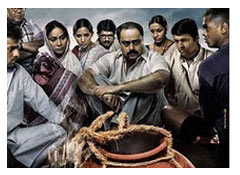
Looking at the performances of the artistes, Seema Biswas plays the role of Mother with simplicity, paying more attention on her body language. Shashank Shende as Mill worker –father, is a perfect choice. Both Sachin Khedkar and Vinay Apte as Union leaders do well ; but surprisingly the character of the Chief Union leader –Doctor, does not get much of scope, considering the major role played by him in the controversial strike. Satish kaushik as Mama in the neighborhood, borrows the voice of Mahesh Manjrekar for this Marathi version, while Santosh Juvekar dubs his voice for Karan Patel, who plays Naru -the younger son of this mill worker, who later turns a sharp shooter. Actually, Santosh would have been a perfect choice for this character. Siddharth Jadhav as Speed breaker ( His character name), plays the son of a Union leader in his own style.
Actress Veena Jamkar plays an important character of Manju- the daughter of the Mill worker. She plays her part with total commitment . Kashmira Shah plays Mami – wife of Satish kaushik. Her sex appeal has been used for a different reason in this film to create that cheap humour. Sai Tamhankar has been a waste in that small role of a flower vendor. Kishore Pradhan and Sameer Dharmadhikari look very natural as Mill owners. Music does not have much scope in this film backed with a serious theme. In all, ‘Lalbaug Parel’ is a good, realistic and hard hitting film except for the violence part, which has been stretched too much in few sequences.
‘I believe in quality than quantity’ – Veena Jamkar
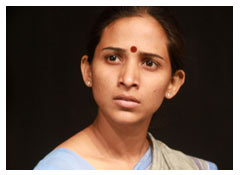
For the past 15 years she has sincerely devoted herself to Marathi stage, performing in many experimental plays, most of them bagging the awards. Veena Jamkar, after passing out from Mumbai’s D.G. Ruparel College made her mark into films through ‘Bebhaan’ only few years ago. Thereafter, Veena’s talent was exploited in films like ‘Valoo’ and ‘Gabhricha Paus’ which followed. Now, she is making waves through her latest performances in films like ‘Marmabandh’ and ‘ Janm’ which were shown at various film festivals. Besides these two films, her much talked about film ‘Lalbaug Parel’ is due for release in coming week. Having already been declared the most promising upcoming actress by the Maharashtra Government award conferred upon her three years ago, she has proved that every film she acted in, turned out to be not only a hit but an award winning film.
Veena Jamkar shares her experience in Marathi film industry with Marathimovieworld. Excerpts from an interview:
Q: Watching your films released so far, gives an indication that you have only performed in off beat films and not any commercial or comedy films. Your comments.
A: In fact, the films I did had off beat content, but they were all commercial films. Moreover, these films did a good business at ticket counter. Today, the definition of Parallel films and commercial films has changed. If you are presenting a good realistic script with the support of quality technical production, then it will surely be termed as commercial film. Instead of simply doing make-up and singing and dancing in front of the camera, I would always prefer to do memorable roles.
Q: Does it mean that you are choosy about the roles ?
A: Yes, luckily for me, all those roles coming to me turned out to be good. Though some of the roles were small, they remained in the memory of the people. I always believe in studying my character and background of the script in detail, instead of just paying attention on the dialogues provided to me by the director.
Q: You have worked with today’s talented young directors like Umesh Kulkarni, Satish Manvar and Girish Kulkarni. How was your personal experience working with them ?
A: Great! It was a pleasure working with all of them. Umesh is very talented and knows his job well. While working on the sets of ‘Valu I’ was closely observing his work. Satish too has deep knowledge about Dramas and films. Working in ‘Gabhricha Paus’ was a memorable experience. When you work with such people, obviously, there is ample scope for self improvisation. I consider myself lucky that at the beginning of my career, I had an opportunity to work with such people.
Q: You will be soon seen in Mahesh Manjrekar’s much talked about film ‘Lalbaug Parel’. What role are you playing in this film ?
A: This film is based on the lives of mill workers in Mumbai, who had to lose their jobs due to indefinite strike. I am playing the daughter of one such mill worker, whose life changes after the strike. What she does for survival and how she adjusts with her new life is all that this central character of mine would explain. This is the biggest role so far I have received in films. I am also in the Hindi version of this film. The role does have different shades.
Q: Now days, you are only seen in films. How about doing TV serials and stage plays ?
A: I have been receiving offers from TV serials. But, I just don’t want to accept them. I have got few films with limited or small roles and all those roles are good. I believe in quality than quantity. With my long experience of 15 years in theatre I am tempted to take few offers. Frankly speaking, just by doing theatre you cannot survive. Recently, I did perform in Atul Pethe’s experimental play ‘Dalpatsingh Yeti Gava’, which has very good script. I am also doing two more plays, ‘Char Diwas Premache’ and ‘Ek Rikami Bajoo.
Q: It has been observed that all your films have received international acclaim or awards. Is this a coincidence or your calculated move?
A: (Smiles). May be a coincidence. But, I am so happy about it. I am really glad that I was part of these films like ‘Bebhaan ‘ ‘Valu’, ‘Gabhricha Paus’, Janm and ‘Marmabandh’.